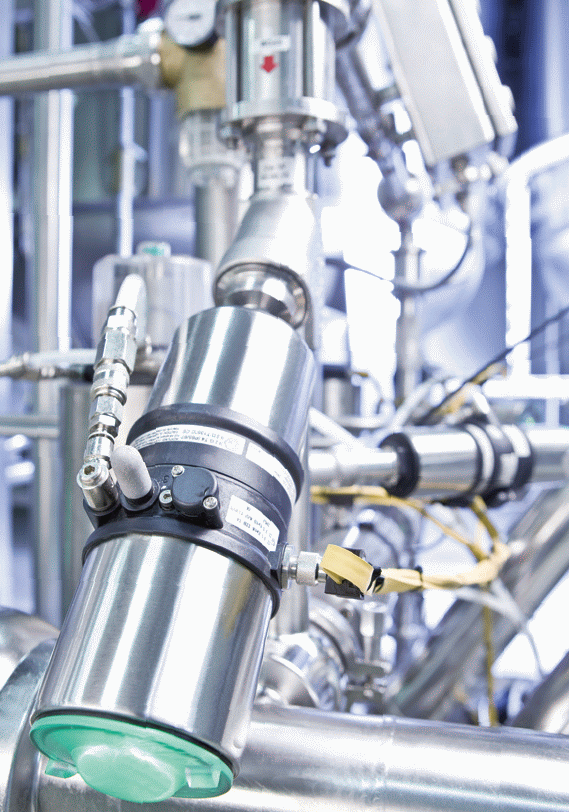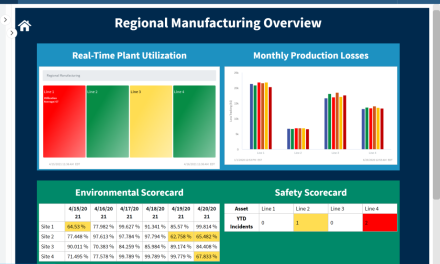 Bürkert Fluid Control Systems explains how it offers three different, yet equally important, approaches to automation: centralised and decentralised automation, and locally installed, compact pneumatic valve block automation systems, and why a combination of all three often provides the best results.
Bürkert Fluid Control Systems explains how it offers three different, yet equally important, approaches to automation: centralised and decentralised automation, and locally installed, compact pneumatic valve block automation systems, and why a combination of all three often provides the best results.
In food and beverage processing, the key to finding the best possible automation solution is often by a thorough analysis of each individual part of the plant or installation. In this way, the question of where plant intelligence should rest can be answered: i.e. does the nature of the application require centralised control interfacing to non-intelligent nodes, or does the physical size of the system mean that control has to be decentralised – using a fieldbus system and intelligent valves and actuators.
The best solution for large and complex plants is usually not a single, one-dimensional automation concept, but an intelligent combination of different concepts. To meet these needs, Bürkert offers three automation approaches in parallel: centralised and decentralised automation, as well as locally installed, compact pneumatic valve block automation systems.
The centralised control concept is the most traditional of the three, and is still important even though it has been somewhat displaced in many larger plants. One of the drawbacks of such systems is extended control air lines that increase air consumption and have a negative effect on the switching times of the valves. In addition, there are also hygiene concerns. According to HACCP, every additional control air and feedback line within the production plant is a potential source of contamination and risk, and must therefore be monitored, serviced and cleaned regularly – a costly undertaking.
Decentralised automation is a more recent concept. It employs intelligent pneumatic process and control valves for all production processes, and utility circuits such as steam, cleaning and temperature control media.
The result is flexible project planning, installation and maintenance, as well as transparency for process control. Decentralised automation systems eliminate the problems of centralised systems because automation functions are integrated directly, as part of the process valves. This minimises the number of cables and compressed air lines needed.
By integrating an AS interface as a fieldbus interface, the advantages of intelligent valves can be fully utilised. All that is required for the power supply, feedback and communications is a two-wire connection, interfacing the PLC with up to 62 valves. Each process valve is connected directly to the main compressed air supply line in the field, reducing the number and length of tube and cable connections, as well as the number of required control cabinets to a minimum. The Element range of process valves are themselves designed according to the EHEDG guidelines for hygienic design and easy cleaning: they feature the high IP protection required by the actual application, and are made of detergent-proof materials. As a result, they are not affected by prolonged use in humid environments, or by frequent chemical cleaning cycles.
Flexible pneumatic valve units and compact automation systems bridge the gap between centralised and decentralised automation. Using stainless steel attachments plates, these units are wall-mounted directly inside small, hygienically designed cabinets that can be installed close to process. They eliminate the long runs to valves and field devices, and can be easily kept clean.
Bürkert’s AirLINE Quick is an example of this concept, and complements Bürkert’s valve terminals and automation systems. All pneumatic connections, the Fieldbus interface and the I/O modules can be mounted directly on the control cabinet base or side, allowing for a smaller design of control cabinet. This also eliminates the need for additional components such as pipes, cables or control cabinet connections, which reduces installation and commissioning time.
By employing its three-tier automation approach, Bürkert can provide independent consulting and flexible hygienic processing control solutions from a single source. The high degree of standardisation makes the engineering and commissioning of automation systems easier and less costly.
Bürkert Fluid Control Systems
T: 01453 731353


